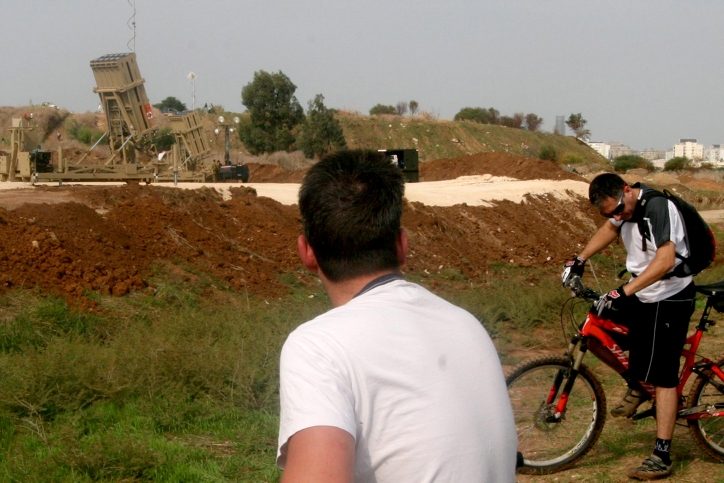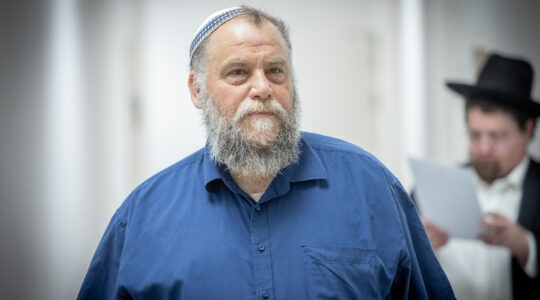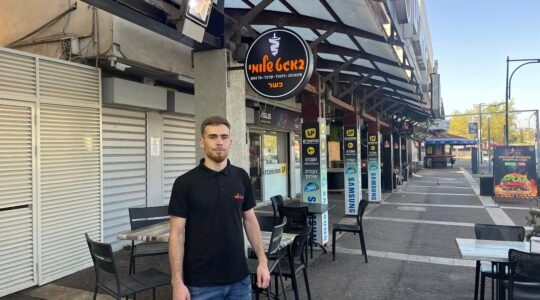
Tourists bathing on the beach as air raid sirens are heard for the fourth day in a row in Tel Aviv, Nov. 18, 2012. (Gideon Markowicz/FLASH90)
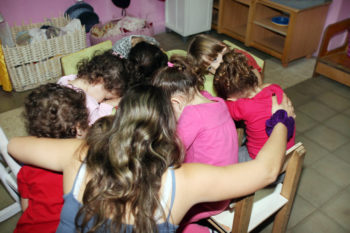
Young children practicing taking cover in the event of an air raid siren in the Tel Aviv area, Nov. 18, 2012.
(Gideon Markowicz/FLASH90)
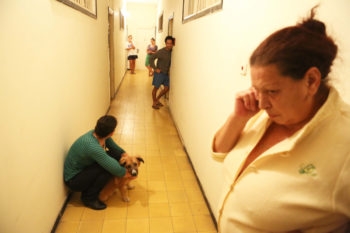
Israelis taking shelter in the stairway of their Tel Aviv apartment building as an air raid siren is heard in the area, Nov. 17, 2012. (Yehoshua Yosef/FLASH90)
TEL AVIV (JTA) – The siren had sounded, the rocket had struck and Tel Aviv’s cafes were still full.
It had been 21 years since Tel Avivis last heard the pulsating blare foretelling an imminent explosion in their city, when Saddam Hussein fired Scud missiles at Israel during the 1991 Gulf War.
When the first boom of the latest conflict with Hamas sounded in the Tel Aviv area on the evening of Nov. 15, area residents got a taste of daily life in Israel’s South, where missiles have fallen constantly for years.
Israelis from elsewhere often refer to Tel Aviv as “the bubble” — insulated not just from the dangers of Hamas rockets but from a lot of what goes on in the rest of Israel. For a moment last week, it seemed the bubble had popped.
Then Tel Avivis began re-inflating it.
They sat at restaurant tables under the porticos of Ibn Gvirol Street, a central boulevard here, and drank at swanky wine bars. Their cars jammed the roads, even as the Home Front Command said they should have pulled over.
Since the first siren, five more missiles have targeted Israel’s largest population center while the Israel Defense Forces carried out its offensive in Gaza, Operation Pillar of Defense. One of the Tel Aviv-bound missiles landed without causing any injuries or significant damage; five others were shot down by Israel’s Iron Dome missile defense system.
Hamas has fired more than 1,000 rockets and missiles at Israel from Gaza since the operation began last week, with the vast majority landing in southern Israel and a few aimed at Jerusalem.
“People are under pressure,” said Roni Dallal, manager of Shenkin 17 cafe in central Tel Aviv. “I have no customers, no people. They’re watching TV and staying at home with their kids.”
But Ricky Danon, who manages the Bella Vintage clothing store on King George Street, said Tel Aviv residents are “too far away, both in mind-set and geographically” from Gaza to stop living their lives.
“People kept walking on the street during the siren,” she told JTA. Tel Avivis think, “ ‘I’m on top of the world. I have culture, pubs, cafes. Nothing will stop my fun.’ You can’t put Tel Aviv in the bomb shelter. It’s still not Sderot” — the embattled Israeli city near Gaza’s border that has become synonymous with rocket fire.
Nevertheless, many Tel Avivis chafe at the idea that they are disengaged from the country’s problems. They’re quick to recall that 10 years ago, their city was at the center of the second intifada, when Hamas terrorists carried out suicide bombings in the urban heartland.
“I wouldn’t call Tel Aviv a bubble,” said Edan Ozana, who owns a flip-flop store in central Tel Aviv. “Do you know how many terrorist attacks we’ve had?”
Tel Aviv’s municipality has prepared for missile attacks, outfitting parking garages as bomb shelters and retaining 500 employees to assist firemen and paramedics should a missile hit.
Many Tel Avivis experienced missile attacks in the Gulf War, but Ozana and Danon said that for better or worse, this round of explosions is different.
“There were alarms all of the time,” Danon said of the Gulf War. “It was an atmosphere of war. Everyone got gas masks. We were stuck to our radios and there were tons of missiles.”
Ozana recalled how during the Gulf War he left for Jerusalem, which Saddam’s Scuds did not target. “But now they’re also sending missiles there,” he said of the rocket crews in Gaza.
The chairman of the Tel Aviv City Council’s security and fire department committee, Moshe Tiomkin, said that although southern Israel is suffering much more damage than Tel Aviv, people act the same during a missile attack no matter where they live.
You only have a moment to “get to the best-protected place,” Tiomkin said. “A reinforced room, a stairwell, an underground parking lot, an interior room in a building. If you want to live and not get hurt, what’s the difference between Tel Aviv and not Tel Aviv?”
